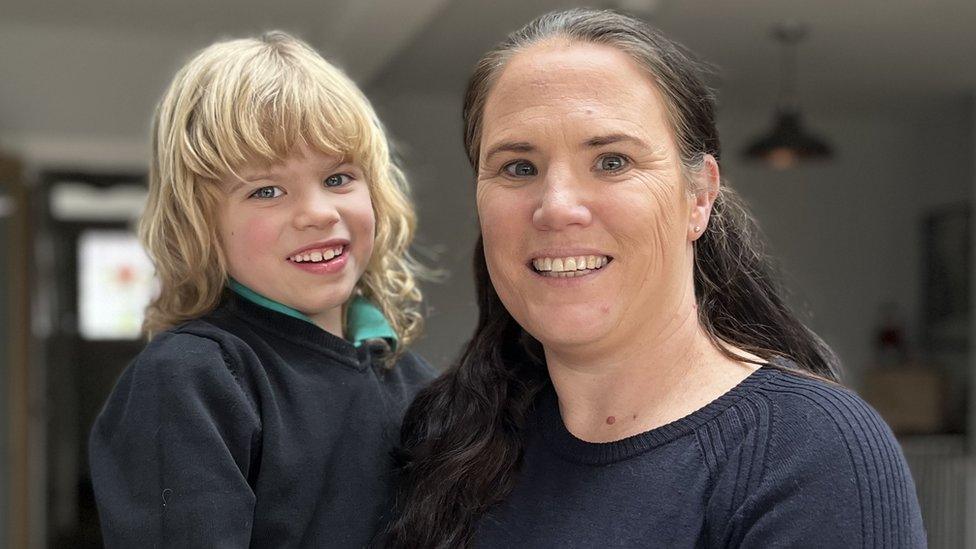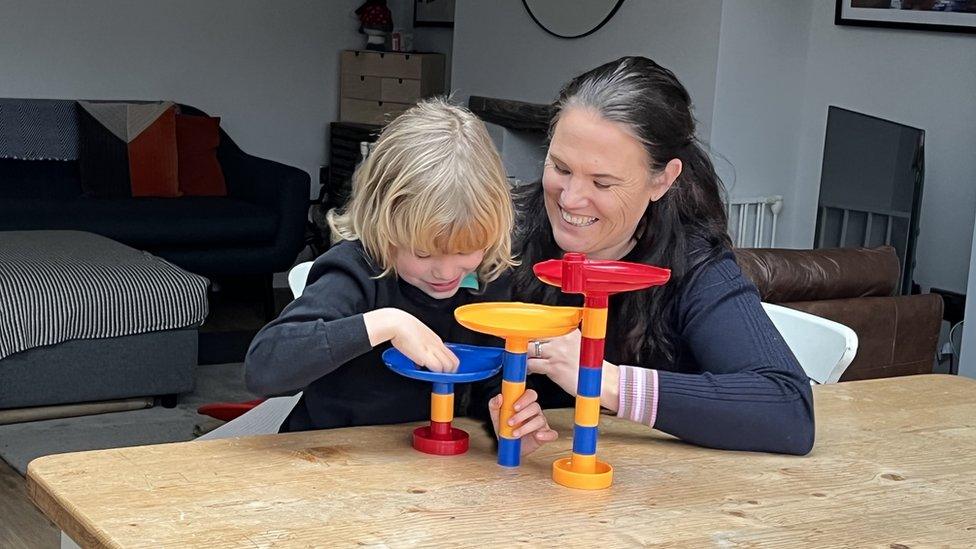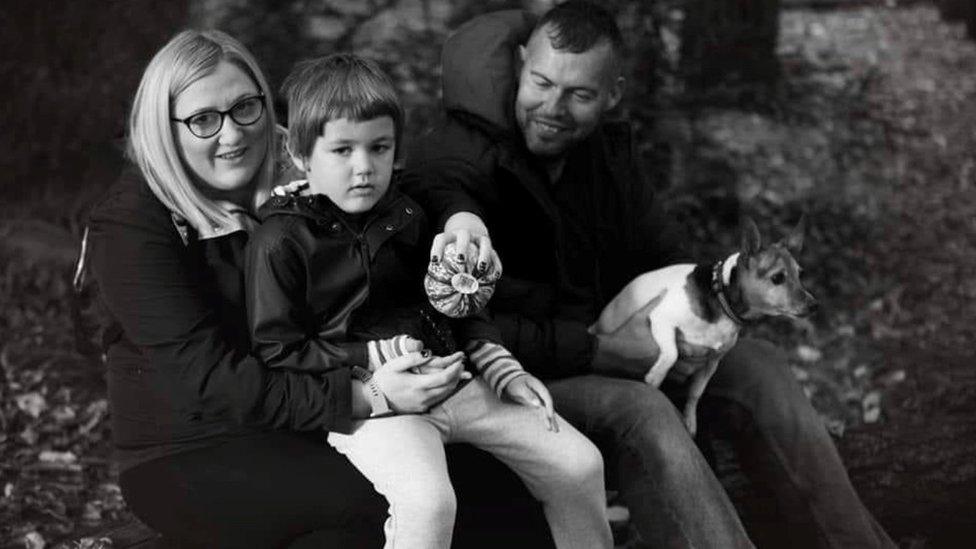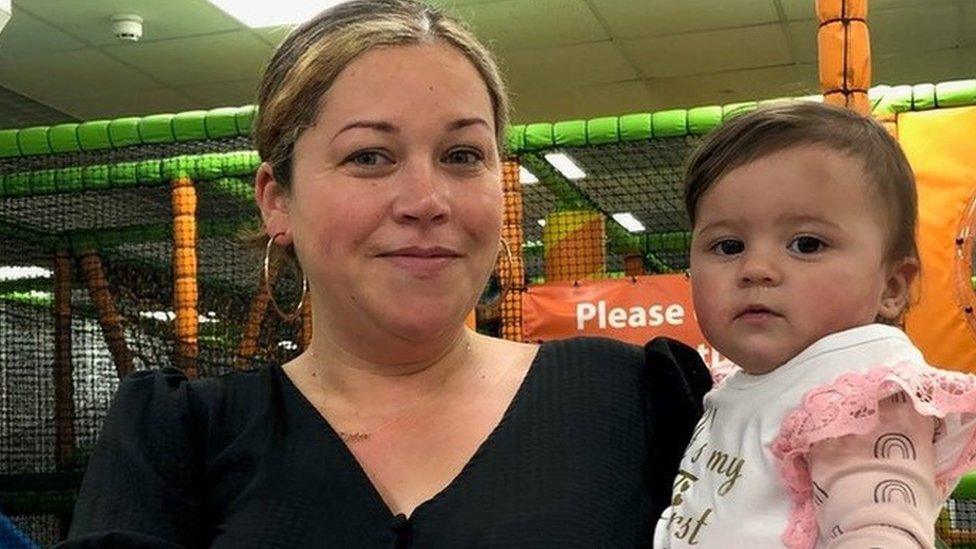Covid: Lack of disabled childcare isolating, parents say
- Published

Maggs runs a blog about her experiences as a special needs parent
More money is needed to increase the number of childcare places in Wales for disabled children, a group of politicians has said.
One Cardiff mother said many parents faced "the rejection, the loneliness, the constant struggle" to get care.
A cross-party Senedd committee report said 38% of councils did not have enough childcare for disabled children anywhere in their area, external.
The Welsh government said work was under way to expand funding.
The body which represents councils, the Welsh Local Government Association (WLGA), said it was considering the findings of the report.
Maggs' seven-year-old son Rhys has autism but does not have any childcare outside of school hours.
The mother-of-three told BBC Politics Wales multiple settings have told her over the years that they could not provide the care he needed, and she has struggled to find funding.
"I've got comments of this is not the right setting for him, or this is not the right setup for your child," she said.

Maggs says she has struggled for several years trying to find childcare for Rhys
Both she and her husband work full-time so have changed their working hours to look after Rhys and their other two young children, as well as getting help from their parents.
Maggs, who writes a blog on her experiences, said it was a "constant struggle to feel like you are doing the best for your child", and had heard from other parents facing similar challenges.
The report, by the Senedd's Equalities and Social Justice Committee, states the charity found families in rural areas and those who worked shifts also found it harder to access care.

The wide-ranging report also looked at barriers which prevent parents, especially women, from returning to the workplace, in turn reducing their earning potential.
A total of 18 recommendations were made, including:
Research and build an evidence base of ethnic minority representation in the childcare workforce and set out targets to increase the number of ethnic minority staff in the sector
Improve cultural awareness training for all childcare providers
Improve pay and working conditions for childcare workers
More detail about plans for universal wrap-around care around school hours, including after school clubs
Ensure free childcare is available for children with complex and additional needs from the age of two
Make it easier for parents with irregular working patterns and zero-hours contracts to access childcare provision
Review and reduce the eligibility of each parent earning up to £100,000 per year


Claire and Elfyn lost all childcare provision for their six-year-old son Owain
Claire, from Bangor, lost all childcare provision for her six-year-old son Owain, who has complex needs, including autism and is non-verbal, during the pandemic.
Her husband Elfyn, who is self-employed, reduced his hours to help care for him.
After a lengthy application process they are due to receive six hours of childcare a week, but no start date has been confirmed.
Long-term they said they now question whether it will be possible for both of them to work full-time.
Claire said: "It's not easy. You can't just leave him with someone who doesn't know his needs."
Disability charity Contact said its survey of 3,000 UK families with disabled children found 33% had to quit a job due to a lack of childcare or respite care.

Claire and her husband Elfyn doubt they will both be able to work full-time in the future due to childcare issues
Menna Machreth from the charity Mudiad Meithrin - the main provider of Welsh-medium early years care and education - said settings often wanted to welcome every child, but there was not "the support there or the extra hands".
She said the Welsh government needed to give "more sustainable answers about the way ahead".
The Welsh government recently announced £18m to strengthen support for children and young people with additional learning needs.
However, Jenny Rathbone Labour Member of the Senedd and committe chairwoman, said the fall in childcare places was "really staggering" and disabled children had suffered as a result of the pandemic.
She said local authorities needed to "think more" about how to support families.
The WLGA said councils were eager to learn lessons and ensure there were improvements, and were looking forward to working with ministers to strengthen provision.
The Welsh government said: "We provide more than £1.5m a year in support for children with additional needs within the childcare offer, external, and grants of up to £10,000 are available to make settings accessible.
"This year we have also allocated £5m for local authorities to create accessible play opportunities."
BBC Politics Wales, 10:00 GMT on 30 January, or catch up on iPlayer
- Published22 November 2021

- Published27 January 2019

- Published4 April 2018
